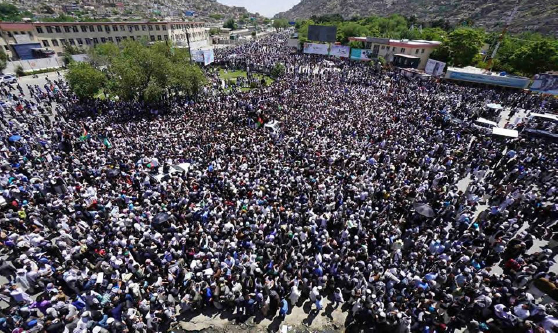
Why is Canada still bankrolling the persecution of Afghanistan’s Hazaras?
Reading time: (Number of words: )
Given the Trump administration’s increasingly divisive policies aimed at Muslims and immigrants in general, Canada increasingly is being seen around the world as a safe haven and sanctuary. With its renewed commitment to the UN, its human rights laws and enlightened immigration policy, Canada looks like a bright light in a dark political climate of ethnic scapegoating.
All of which makes Canada’s silence on Afghanistan’s repeated human rights crimes against one ethic group — the Hazaras — deeply troubling.
The Hazaras, who once represented 60 per cent of Afghanistan’s population, were the victims of systemic ethnic cleansing and genocide in the 18th century under the rule of Amir Abdur Rahman Khan. According to the Australian newspaper The Argus, On October 20, 1893, the brutal dictator sold thousands of Hazaras into slavery.
During the Taliban era the Hazaras were once again the target of a campaign of systematic genocide. In early February 1993 a ruthless warlord named Abdul Rasul Sayyaf descended upon Kabul’s Afshar district to launch an orgy of killing, rape and looting. Human Rights Watch and UN reports indicate that thousands were slaughtered, skinned alive and left on the streets for weeks.
Confident in the goodwill of Canada and the international community, Hazaras were among the first to give up their arms and submit themselves to the political process of democracy in Afghanistan. The Afghan government reciprocated with a general amnesty in 2007, granting absolute immunity to warlords responsible for genocide and war crimes such as Sayyaf.
The Hazaras have been the targets of kidnapping and various forms of discrimination ever since Canada’s Afghan engagement began.
In November 2015, a bus was pulled over and all Hazara passengers were decapitated on the side of the road. Among them was a 9-year-old girl named Shukria Tabassum, murdered simply for being a Hazara.
In July 2016, scores of Hazaras students were peacefully protesting the government’s decision to bar Hazara-populated lands such as Bamiyan from receiving electricity, by redirecting TUTAP’s original trajectory. TUTAP was a mega power project funded by the Asian Development Bank and World Bank.
Canada continues to pour millions of dollars into Afghanistan, despite the evidence of unequal distribution of foreign aid and widespread corruption at the highest levels.
The project’s initial assessment completed by Fichtner, a German engineering consultant, recommended the TUTAP route pass through the province of Bamiyan. This recommendation was promptly vetoed by the Afghan regime.
Human rights activists and journalists alike have been attacked and supressed by the regime after raising the TUTAP issue or the general percussion of the Hazaras. For instance, in May of 2016, where Ghani Ahmadzay was speaking at the Royal United Services Institute, his security protocol brutally attacked and nearly suffocated two young Hazara activists (British citizens) that spoke out against the regime. Just months later in August 2016, the regime ordered the arbitrary arrest of dozens of Bamiyan’s activists and journalists ahead of Ghani Ahmadzay’s trip to that province.
On August 13, 2016, hundreds of Afghan Canadians gathered before Parliament Hill to peacefully protest the Canadian government’s decision to continue its financial support to the current corrupt regime of Kabul at the expense of Canadian taxpayers.
Upon the opening day of the 42nd Canadian Parliament (September 19th 2016), Afghan-Canadian human rights activists held a press conference inside the National Press Theater, reminding the federal government of the plight of the Hazaras and Canada’s responsibilities.
Of the entire Canadian government apparatus, only Senator Mobina Jaffer responded to these cries for help. In a moving speech in the Red Chamber, Senator Jaffer called upon her colleagues and Canadians to stand up for the human rights of the Hazaras.
Unfortunately, while Canada debates whether to act, more lives have been lost. On January 6, nine Hazara miners were abducted and executed on their way to work.
United Kingdom’s former prime minister David Cameron, in a conversation with the Queen, once referred to Afghanistan as “fantastically corrupt” – a country that Canada continues to pour millions of dollars into, despite the evidence of unequal distribution of foreign aid and widespread corruption at the highest levels.
When Canada, like many other nations, decided to enter the Afghan arena in 2001 it did so as part of an international effort to defeat a common enemy that threatened global security. One hundred and fifty-eight of our brave Canadian men and women in uniform paid the ultimate sacrifice fighting that enemy. Yet the failing Afghan regime has repeatedly referred to the Taliban as “our Afghan brothers” — an absurd and disturbing statement for Afghans worldwide, and a slap in the face for the families of Canadian soldiers who died in Afghanistan.
Despite worldwide protests, in early September 2016 the Afghan regime quietly signed a pact with Gulbudin Hekmatyar, known to Afghans as “the butcher of Kabul” and to the U.S. State Department as a terrorist and supporter of both al Qaida and the Taliban. The deal grants Hekmatyar complete immunity for all the atrocities he has thus far committed.
The time to act is now. Will Canada stand up for the human rights of the Hazaras? Will the Trudeau government prevent another young Hazara child from meeting the same tragic fate as Shukria?
Ali Mirzad is a Hazara-Canadian human rights activist.
View online : http://www.hazarapeople.com/2017/03...

Poems for the Hazara
The Anthology of 125 Internationally Recognized Poets From 68 Countries Dedicated to the Hazara
Order Now








